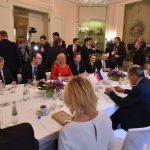ZAGREB, April 4, 2018 – Croatian President Kolinda Grabar-Kitarović said on Wednesday that dialogue was the only way forward for relations between Russia and Western countries, stressing that the time had come to normalise relations between the two sides based on international law and mutual respect.
“If you treat someone as an adversary, they will soon start to behave that way,” Grabar-Kitarović told a press conference after meeting with Bulgarian President Rumen Radev during her day-long visit to Sofia.
Croatia has joined a number of Western countries in expelling Russian diplomats over the poising of former Russian double agent Sergei Skripal and his daughter in the English town of Salisbury, which London blamed on Moscow. Russia responded to the expulsions reciprocally.
“To resolve any disputes and issues, they need to be discussed first. I see Russia as a strong country, a world power with which dialogue needs to continue in any case, both on this and many other issues,” the Croatian president said, citing international security, terrorism, radicalisation and other threats facing the two blocs.
She also emphasised economic interests, adding that she would always advocate for the opening of new markets to Croatian businesses. “We have a number of issues we are dealing with right now, including Agrokor and the Russian banks, and the air pollution in Slavonski Brod. I will absolutely insist on further dialogue on these issues,” Grabar-Kitarović said, expressing hope that Russia would also express a willingness for further talks.
“Russia is also a strong player in Southeast Europe,” she said and recalled that Russia was one of the countries responsible for implementing peace in Bosnia and Herzegovina.
“It is time for us to move towards normalisation of relations based on respect for all postulates of international law and mutual respect, taking into account the future and security of the European continent and international relations in general in the entire region,” the Croatian president said, emphasising that she strongly supported the investigation in the Skripal case and was expecting its results, and that Croatia honoured the sanctions system and European rules.
Bulgarian President Radev said that Bulgaria, which holds the rotating EU presidency in this half of the year, was pursuing the policy of dialogue and balance. “Bulgaria is a loyal member of the EU and NATO, the alliances which are based on certain values, one of which is transparency,” said Radev, who is often perceived as a pro-Russian leader. Before taking any further steps we need to have clear and irrefutable evidence of Russia’s involvement in the Skripal case, the Bulgarian president said.
Bulgaria is one of the EU member states that did not expel Russian diplomats.








